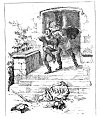
Sacred Texts Sagas & Legends England Index Previous Next

While every one was busied about Florimell, and in hearing the truth about Braggadochio, Sir Guyon, as it befell, came forward from the thickest of the crowd to claim his own good steed, which Braggadochio had stolen long ago. Seizing the golden bit with one hand, he drew his sword with the other, for he meant to smite the thief heavily, and had he not been held he would certainly have done so.
Then a great hurly-burly rose in the hall because of that war-horse, for Braggadochio would not let him pass, and Sir Guyon was quite resolved to have him, or to put the matter to the proof over his dead body. The uproar being perceived by Artegall, he drew near to stay the tumult, and began to ask how the steed had been taken away, whether extorted by might or stolen by cunning.
Then Sir Guyon told him about the Knight and the Lady, whom he and the Palmer had found, and to avenge whom he had gone on his quest against the wicked enchantress, Acrasia. He described how, when he had gone into the thicket to help the dying lady, his horse had been purloined by craft, for which he now challenged the thief to fight. But Braggadochio would by no means consent to this, for he hated such doings, and would rather lose than make trial of his right by an appeal to arms.
Sir Artegall, hearing this, might then have handed over the horse to Sir Guyon, for according to knightly custom there was no need to try one's cause by the law of arms, if a foe refused to meet one in the field. But wishing to establish Guyon's claim properly, he asked him to describe any secret token borne by the horse.
"If that will satisfy you," said Sir Guyon, "there is within his mouth a black spot, shaped like a horse's shoe, for any one who cares to seek for it."
In order to test this, some one took hold of the horse, to look into his mouth; but the creature immediately struck at him so savagely with his heels that he broke his ribs to pieces. Another, who seemed to have a little more sense, took him by the bright embroidered headstall, but the horse bit him so sharply on the shoulder that he was quite disabled. Nor would he open his mouth to a single person until Sir Guyon himself spoke to him, and called him by his name, "Brigadore."
The instant the horse understood his voice he stood stock-still, and allowed every one to see the secret mark; and when his master called him by name he broke all
 Click to enlarge So ought all faytours that true knighthood shame, And armes dishonour with base villanie, From all brave knights be banisht with defame.'' |
his fastenings with joy, and gleefully followed him, frisking, and prancing, and bending his head in submission. Thereupon Sir Artegall plainly saw to whom he belonged, and said--
"Lo, there, Sir Guyon, take to yourself the steed, arrayed as he is in his golden saddle, and let that worthless fellow fare hence on foot, until he has gained a horse."
But the vain braggart began to rate and revile Sir Artegall for giving such an unjust judgment against him. The Knight was so incensed at his insolence that he was tempted to punish him, and thrice he laid his hand on his sword to slay him. But Sir Guyon pacified Sir Artegall, saying it would only dishonour him to wreak his wrath on a churl like that. It would be punishment enough that every one saw his disgrace.
Then Talus seized the boaster, and dragging him out of the hall inflicted this punishment on him, First he shaved off his beard; then he took his shield, and turned it upside down, and blotted out the device; and then he broke his sword in two, and scattered all his armour. After that he openly scourged him out of the court.
So should all traitors who shame true chivalry be banished with infamy from among brave knights, for their evil doings often bring disgrace on just merit.